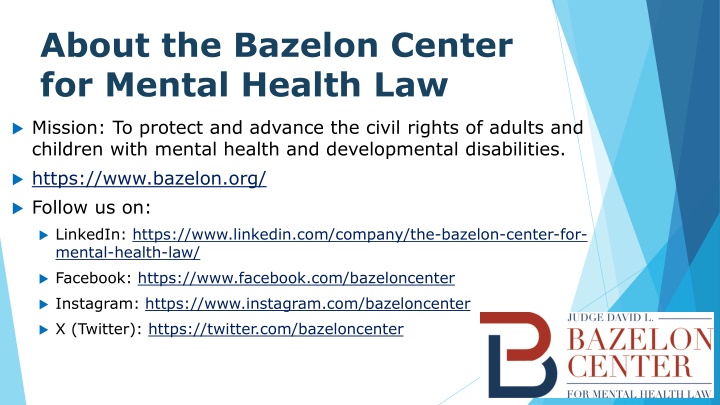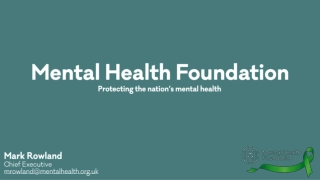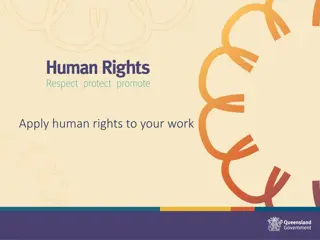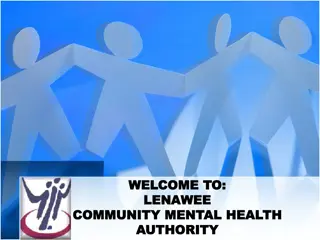Promoting Mental Health Rights for Better Communities
The Bazelon Center for Mental Health Law aims to protect the civil rights of individuals with mental health disabilities, advocating for community-based solutions over criminal enforcement to address homelessness. Learn about their mission and impact. Discover the myths and realities surrounding mental health and homelessness, and explore effective solutions like supportive housing and peer support services.
Download Presentation

Please find below an Image/Link to download the presentation.
The content on the website is provided AS IS for your information and personal use only. It may not be sold, licensed, or shared on other websites without obtaining consent from the author.If you encounter any issues during the download, it is possible that the publisher has removed the file from their server.
You are allowed to download the files provided on this website for personal or commercial use, subject to the condition that they are used lawfully. All files are the property of their respective owners.
The content on the website is provided AS IS for your information and personal use only. It may not be sold, licensed, or shared on other websites without obtaining consent from the author.
E N D
Presentation Transcript
About the Bazelon Center for Mental Health Law Mission: To protect and advance the civil rights of adults and children with mental health and developmental disabilities. https://www.bazelon.org/ Follow us on: LinkedIn: https://www.linkedin.com/company/the-bazelon-center-for- mental-health-law/ Facebook: https://www.facebook.com/bazeloncenter Instagram: https://www.instagram.com/bazeloncenter X (Twitter): https://twitter.com/bazeloncenter
Johnson v. Grants Pass Mental Health Amicus Brief Submitted by the Bazelon Center for Mental Health Law, American Psychiatric Association, National Alliance on Mental Illness, National Association for Rural Mental Health, and National Association of Social Workers, the brief made two main points: 1. Arresting or fining people experiencing homelessness for trying to survive disproportionately impacts and harms people with mental health disabilities; and 2. Community-based housing and mental health services are far more effective than criminal enforcement in addressing homelessness for people with mental health disabilities Read the mental health amicus brief (PDF)
Disproportionate Impact Myth busting: Most people experiencing homelessness do not have a mental health condition. Homelessness is more frequently triggered by economic factors e.g., job loss, debt. (American Psychiatric Association) December 2023: HUD estimates 653,100 Americans are homeless January 2023: SAMHSA estimates more than 20% of people experiencing homelessness currently has a serious mental illness, compared with 5.6% of the general population June 2023: 27% of Californians experiencing homelessness had been hospitalized for a mental health condition, with more than half of those hospitalizations occurring prior to their first instance of homelessness
Disproportionate Harm Physical Harm and Death: People with mental health disabilities are: 12 times more likely to experience police use of force; 16 times more likely to be killed by law enforcement Unnecessary Arrest and Incarceration: Jail systems are now among the largest providers of mental health care in the United States Once in jail, people with serious mental illness can remain incarcerated twice as long or longer as others and most don t receive mental health treatment Upon release with a criminal record, people are more likely to be unemployed, homeless, and rearrested
Solutions Exist Community-based housing and mental health services are far more effective. Examples include: Supportive housing Assertive community treatment Mobile crisis services Supported employment Peer support services Alternative interventions are also cost-effective for communities. Supportive housing is: One quarter the cost of incarceration, and One tenth the cost of psychiatric hospitalization
Additional Concerning Trends Federal and State: Efforts to increase federal funding for institutions State and Local: Lowered barriers to involuntary commitment State and Local: Post-Grants Pass directives
Efforts to Increase Institutionalization Background: Since 1965, Medicaid has not authorized federal reimbursement for services provided to individuals ages 21-64 in an institution for mental disease (IMD). Congress intent: encourage state investment in community-based services, rather than institutions. Congress: Calls to weaken or repeal the IMD Rule States: 1115 Waiver applications to get Medicaid reimbursement for IMDs Calls for more beds
Responses to Efforts to Increase Institutionalization 1. We tried it before and it did not work Demonstration Program Final Evaluations found: No decrease in ER admissions or lengths of stay; No decrease in hospital admissions or lengths of stay; No improvement in access to care; No cost savings to communities. 2. Even short stays in IMDs are harmful Illinois Court Monitor found no evidence of active treatment and significantly higher critical incidents including sexual assault, abuse, neglect, and death 3. Any weakening of the IMD rule is inconsistent with federal civil rights laws ADA Integration Mandate; Olmstead v. L.C. (Lois Curtis)
Efforts to Lower Barriers to Involuntary Commitment Nationwide Cicero Institute Model Legislation, section G State Level Homelessness Criminalization California: CARE Court & SB 43 in Plain Language (DRC) New York City: Mayor s Directive on Mental Health Involuntary Removals
Responses to Efforts to Lower Barriers to Involuntary Commitment Advocate in Your Local Community: What Communities Need to Know About the Criminalization of Homelessness (National Alliance to End Homelessness) Combating Punitive State Bills and Laws: Emerging Strategies to Combat State-Level Punitive Bills (NAEH) Housing Not Handcuffs Toolboxes (NHLC) Advocating for What Works: Tell your elected officials to fund housing and solve homelessness (NHLC) Increase Accessible Housing (The Kelsey) Media & Messaging Guidance: Housing Narrative Lab Everyone Needs a Safe Place to Sleep: Message Guidance Executive Summary Abbreviated Field Guide for Narrative Change
Example: Post-Grants Pass Directive and Local Responses California: Governor s post-Grants Pass Executive Order Whereas, post-Grants Pass, there is no longer any barrierto local governments to address encampments with both urgency and humanity, or excuse for not doing so Local Responses San Francisco: Journey Home Executive Directive Los Angeles Won t Comply: won t use jails as makeshift shelters San Jose Won t Enforce, but mayor says need inpatient treatment beds
Thank You Monica Porter Gilbert Policy & Legal Advocacy Attorney monicag@bazelon.org























